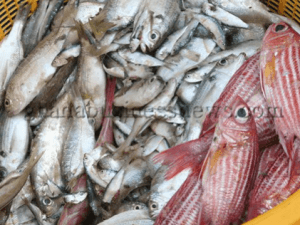Ministry to pursue sustainable fisheries management strategies
 Ms Sherry Ayittey, the Minister of Fisheries and Aquaculture Development (MOFAD) on Tuesday, said her sector was pursuing pragmatic strategies aimed at ensuring sustainable fisheries management to increase production capacities.
Ms Sherry Ayittey, the Minister of Fisheries and Aquaculture Development (MOFAD) on Tuesday, said her sector was pursuing pragmatic strategies aimed at ensuring sustainable fisheries management to increase production capacities.
She said there was currently a huge fishery production deficit of about 50 per cent owing to the fact that the industry was not able to meet the requisite annual production capacity of 950,000 metric tonnes of fish.
Ghana is able to produce only 450,000 metric tonnes, leaving a huge deficit which was often covered through importation from other countries.
According to her the Ghana National Aquaculture Development Plan seeks to augment fish production and reduce importation of fish and fishery products, and major strategies pursued include improved extension services delivery, developing a national aquaculture suitability map focusing on prioritise high potential aquaculture zones to attract private sector investment and to facilitate the improved inputs to farmers.
This, she said, would contribute to an increase in the production of safe and quality fish to close the current deficit of national fish requirement.
The Minister said it was worrying to note that in spite of the 50 per cent deficit in the country’s domestic fish requirement, post-harvest losses in the sector was estimated in the region of 37 per cent.
Ms Ayittey who took her sector’s turn at the Meet-the-Press series in Accra to brief the media on the activities of the Ministry, said a number of strategies, policies and interventions were being put in place and vigorously pursued to bridge the gap and improve the quality of fish produces to ensure food safety.
She cited policy and strategic interventions such as the amendment of the Fisheries Act (Act 880) and the Fisheries Regulations, 2015 (L.I.2217), which addresses the challenges and deficiencies in legislation militating against sustainable management of fisheries and enforcement of regulations to fight, deter and prevent Illegal, Unreported and Unregulated (IUU) fishing.
She said the canoe registration and embossment project under the World Bank supported West African Regional Fisheries project, and the development of a Fish Health Management Policy to prescribe measures and guidelines for good management practices for rearing safe and quality fish for consumption, were concrete strategies to improve the performance in the sector.
The Fish Health Management Policy also seeks to facilitate the adoption of good husbandry practice to control and prevent the incidence of diseases and to stop the spread of diseases.
Ms Ayittey also said plans were advanced to improve the capacities of fish farmers and relevant stakeholders to appreciate, and pay attention to the health issues of their enterprises.
According to her the Gross Domestic Product (GDP) contribution of the sector declined from 2.3 per cent in 2010 to 1.4 per cent in 2014, due to the rebasing of the economy to accommodate the oil and gas sectors, but the sector’s contribution to agricultural GDP increased consistently from 2.3 per cent to 7 per cent within the same years, she said.
She said in spite of these, fish remains one of the country’s most important non-traditional export commodities and valued at about 318 million dollars in 2014 as against $183 million in 2013 representing an increase of 34. 4 per cent.
The sector employs over 2.7 million Ghanaians as fishers, processors, boat owners and builders, as well as other ancillary jobs, and due to these the fisheries frontiers were expanding due to the significant progress made in the aquaculture sub-sector and the introduction of a new high valued shrimp culture niche.
Ms Ayittey said the fishery industry was however saddled with challenges including over exploitation of fish stocks, over capacity, pollution of water bodies, use of illegal methods and gear in fishing, high post-harvest losses, high cost of aquaculture inputs, inadequate hatcheries, weak extension and inadequate staff.
She said the Ministry was also on course to acquire a research vessel to enhance resource surveys and align its current fishing efforts to the carrying capacity of its resources, and has approved a new Marine Fisheries Management Plan for the period 2015 to 2019 to implement measures including closed seasons, marine protected areas, capacity and effort reduction and capping of fishing fleets with the view of ensuring sustainable fisheries management and meeting international conservation of fish stocks.
Source: GNA
